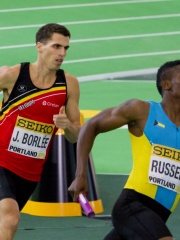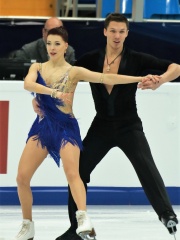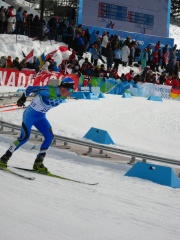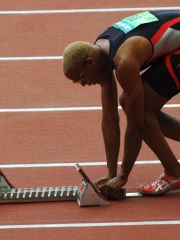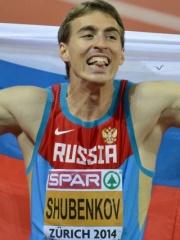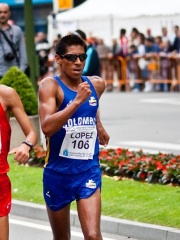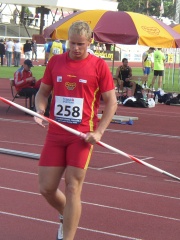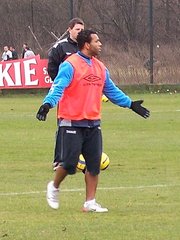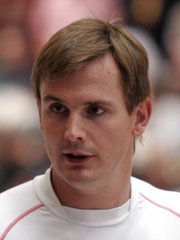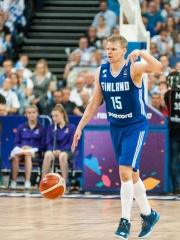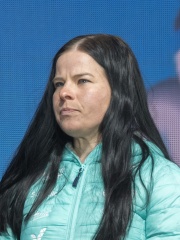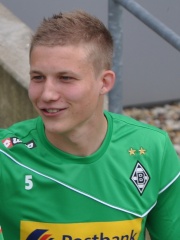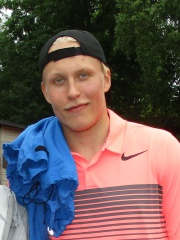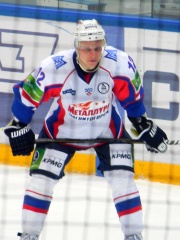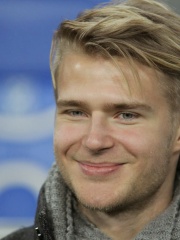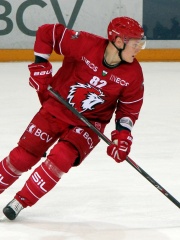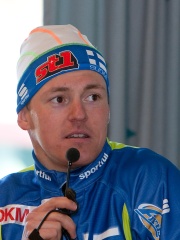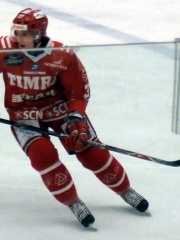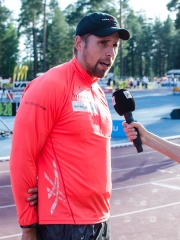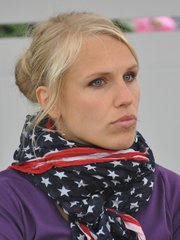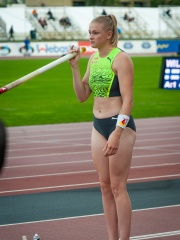Athlete
Sanna Stén
1977 - today

 Sanna Stén
Sanna Stén
Sanna Stén (born 20 May 1977 in Lohja) is a Finnish rower. She won a silver medal in the women's lightweight double sculls at the 2008 Summer Olympics. Read more on Wikipedia
Her biography is available in 16 different languages on Wikipedia. Sanna Stén is the 5,361st most popular athlete (down from 5,263rd in 2024), the 710th most popular biography from Finland (up from 711th in 2019) and the 119th most popular Finnish Athlete.
Memorability Metrics
Page views of Sanna Stén by language
Among Athletes
Among athletes, Sanna Stén ranks 5,361 out of 6,025. Before her are Alonzo Russell, Emilia Tsoulfa, Dmitri Soloviev, Maria Borodakova, Jaakko Tallus, and Marc Raquil. After her are Stephen Jones, Lynn Jennings, Sergey Shubenkov, Yang Min, Luis Fernando López, and Jakub Vadlejch.
Most Popular Athletes in Wikipedia
Go to all RankingsAlonzo Russell
1992 - Present
HPI: 39.40
Rank: 5,355
Emilia Tsoulfa
1973 - Present
HPI: 39.40
Rank: 5,356
Dmitri Soloviev
1989 - Present
HPI: 39.40
Rank: 5,357
Maria Borodakova
1986 - Present
HPI: 39.39
Rank: 5,358
Jaakko Tallus
1981 - Present
HPI: 39.39
Rank: 5,359
Marc Raquil
1977 - Present
HPI: 39.39
Rank: 5,360
Sanna Stén
1977 - Present
HPI: 39.38
Rank: 5,361
Stephen Jones
HPI: 39.38
Rank: 5,362
Lynn Jennings
1960 - Present
HPI: 39.38
Rank: 5,363
Sergey Shubenkov
1990 - Present
HPI: 39.38
Rank: 5,364
Yang Min
1963 - Present
HPI: 39.37
Rank: 5,365
Luis Fernando López
1979 - Present
HPI: 39.36
Rank: 5,366
Jakub Vadlejch
1990 - Present
HPI: 39.35
Rank: 5,367
Contemporaries
Among people born in 1977, Sanna Stén ranks 1,177. Before her are Kan Kikuchi, Florian Kehrmann, Randy Moss, Makoto Sunakawa, Dorel Simion, and Marc Raquil. After her are Jean Paulista, Emanuele Belardi, Ben Ainslie, Aurtis Whitley, Steven Bryce, and Martin Boquist.
Others Born in 1977
Go to all RankingsKan Kikuchi
SOCCER PLAYER
1977 - Present
HPI: 39.45
Rank: 1,171
Florian Kehrmann
HANDBALL PLAYER
1977 - Present
HPI: 39.43
Rank: 1,172
Randy Moss
AMERICAN FOOTBALL PLAYER
1977 - Present
HPI: 39.43
Rank: 1,173
Makoto Sunakawa
SOCCER PLAYER
1977 - Present
HPI: 39.41
Rank: 1,174
Dorel Simion
POLITICIAN
1977 - Present
HPI: 39.39
Rank: 1,175
Marc Raquil
ATHLETE
1977 - Present
HPI: 39.39
Rank: 1,176
Sanna Stén
ATHLETE
1977 - Present
HPI: 39.38
Rank: 1,177
Jean Paulista
SOCCER PLAYER
1977 - Present
HPI: 39.35
Rank: 1,178
Emanuele Belardi
SOCCER PLAYER
1977 - Present
HPI: 39.35
Rank: 1,179
Ben Ainslie
ATHLETE
1977 - Present
HPI: 39.31
Rank: 1,180
Aurtis Whitley
SOCCER PLAYER
1977 - Present
HPI: 39.30
Rank: 1,181
Steven Bryce
SOCCER PLAYER
1977 - Present
HPI: 39.28
Rank: 1,182
Martin Boquist
HANDBALL PLAYER
1977 - Present
HPI: 39.27
Rank: 1,183
In Finland
Among people born in Finland, Sanna Stén ranks 710 out of 751. Before her are Teemu Rannikko (1980), Krista Pärmäkoski (1990), Alexander Ring (1991), Patrik Laine (1998), Lasse Kukkonen (1981), and Jaakko Tallus (1981). After her are Paulus Arajuuri (1988), Harri Pesonen (1988), Sami Jauhojärvi (1981), Robin Lod (1993), Mika Pyörälä (1981), and Robert Ivanov (1994).
Others born in Finland
Go to all RankingsTeemu Rannikko
BASKETBALL PLAYER
1980 - Present
HPI: 39.62
Rank: 704
Krista Pärmäkoski
SKIER
1990 - Present
HPI: 39.55
Rank: 705
Alexander Ring
SOCCER PLAYER
1991 - Present
HPI: 39.54
Rank: 706
Patrik Laine
HOCKEY PLAYER
1998 - Present
HPI: 39.52
Rank: 707
Lasse Kukkonen
HOCKEY PLAYER
1981 - Present
HPI: 39.43
Rank: 708
Jaakko Tallus
ATHLETE
1981 - Present
HPI: 39.39
Rank: 709
Sanna Stén
ATHLETE
1977 - Present
HPI: 39.38
Rank: 710
Paulus Arajuuri
SOCCER PLAYER
1988 - Present
HPI: 39.20
Rank: 711
Harri Pesonen
HOCKEY PLAYER
1988 - Present
HPI: 39.20
Rank: 712
Sami Jauhojärvi
SKIER
1981 - Present
HPI: 39.19
Rank: 713
Robin Lod
SOCCER PLAYER
1993 - Present
HPI: 39.14
Rank: 714
Mika Pyörälä
HOCKEY PLAYER
1981 - Present
HPI: 39.14
Rank: 715
Robert Ivanov
SOCCER PLAYER
1994 - Present
HPI: 39.13
Rank: 716
Among Athletes In Finland
Among athletes born in Finland, Sanna Stén ranks 119. Before her are Jari Mantila (1971), Wille Mäkelä (1974), Päivi Alafrantti (1964), Mikko Ronkainen (1978), Mikaela Ingberg (1974), and Jaakko Tallus (1981). After her are Markku Koski (1981), Minna Nieminen (1976), Antti Ruuskanen (1984), Minna Kauppi (1982), Peetu Piiroinen (1988), and Wilma Murto (1998).
Jari Mantila
1971 - Present
HPI: 41.03
Rank: 113
Wille Mäkelä
1974 - Present
HPI: 40.85
Rank: 114
Päivi Alafrantti
1964 - Present
HPI: 40.35
Rank: 115
Mikko Ronkainen
1978 - Present
HPI: 40.11
Rank: 116
Mikaela Ingberg
1974 - Present
HPI: 39.88
Rank: 117
Jaakko Tallus
1981 - Present
HPI: 39.39
Rank: 118
Sanna Stén
1977 - Present
HPI: 39.38
Rank: 119
Markku Koski
1981 - Present
HPI: 38.79
Rank: 120
Minna Nieminen
1976 - Present
HPI: 37.74
Rank: 121
Antti Ruuskanen
1984 - Present
HPI: 37.13
Rank: 122
Minna Kauppi
1982 - Present
HPI: 36.99
Rank: 123
Peetu Piiroinen
1988 - Present
HPI: 36.97
Rank: 124
Wilma Murto
1998 - Present
HPI: 36.14
Rank: 125
